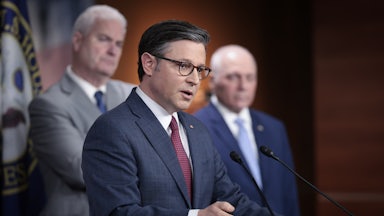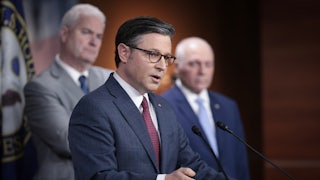The first Republican presidential primary debate may still be months away, but its fault lines are already widening. The nascent field is caught up in proxy debates about spending and social services, with some candidates pushing for severe cuts to Medicare and Social Security and others promising to protect those programs—albeit with fingers crossed behind their backs. On Ukraine, there is also deep division: Ron DeSantis and Donald Trump have argued that continued support for the country is not in America’s interests while Mike Pence and Nikki Haley have pledged to continue to help fund the country’s resistance to Russian imperialism. And then there are the Covid vaccines: Trump has touted them as one of his administration’s biggest accomplishments; DeSantis has made unfounded skepticism about their safety a cornerstone of his shadow campaign.
But there’s one area in which there is little if any division: the riot at the Capitol on January 6, 2021. Donald Trump has, over the past two years, made the idea that the election was stolen the centerpiece of his political project. Raving about made-up claims of vote dumps and other alleged irregularities, he has increasingly also claimed that the assault on the Capitol was, in fact, peaceful, and that the hundreds of people who have been convicted of, among other things, assaulting police officers and disrupting the democratic process, should be immediately released from prison.
This is all, without a doubt, delusional. Calling it merely “counterfactual” or “false” doesn’t come close to capturing the magnitude of Trump’s against-reality beliefs. None of Trump’s allegations about the 2020 election have even come close to being substantiated; the assault on the Capitol was the violent climax of a monthslong run-up to a coup attempt. Trump’s own culpability is obvious—he is solely responsible for the attack, which left several dead and many injured. It is perhaps the clearest and most obvious fodder for an anti-Trump attack ad as you’ll find. And yet, most of his rivals barely talk about January 6.
Trump has succeeded in making January 6—and, with it, his lies about the election—a purity test for his rivals. They know that it is a line they have to walk carefully, if not avoid crossing altogether: If they have any hope of winning the nomination, let alone the presidency, they will need to win over scores of Trump’s voters. Doling out tough love—in this case, acknowledging the truth about the Capitol riot—is not a viable strategy within the GOP. Instead, a particularly surreal situation has emerged in which Trump has, perhaps in spite of himself, set a trap for his rivals. If they acknowledge that the election wasn’t stolen, they will undoubtedly alienate the diehards they need to win over. If they acknowledge that Trump was the rightful winner and that January 6 was a boy scout jamboree rather than a violent riot, then they will be backing the idea that Trump not only deserves to be president but is the rightful president—and by extension, the leader of the Republican Party, wrongly denied a second term.
Naturally, all of Trump’s rivals do want to deny him a second term, and so they’re largely trying to win Trump’s January 6 gambit by refusing to play. DeSantis, in particular, has avoided engaging with the issue altogether—a part of a larger plan of mimicking Trump’s policy positions whenever possible (with Covid-19 vaccines being the one big exception). In his part remarks, DeSantis has only sparingly addressed the riot. “It was totally unacceptable and those folks need to be held accountable,” DeSantis said on January 6, 2021. “It doesn’t matter what banner you’re flying under — the violence is wrong, the rioting and disorder is wrong.”
In subsequent public statements, he has tried to walk a third path, in which he neither condones nor supports the riot or the actions that led up to it—instead, as many Republicans do, he argues that coverage of it is overblown and that Democrats are exploiting a few acts of violence to punish their political enemies. A year after the riot, for instance, DeSantis compared it to “Christmas” for “D.C.–New York media.”
“They are going to take this and milk this for anything they could to try to be able to smear anyone who ever supported Donald Trump,” DeSantis said at a press conference. “When they try to act like this is something akin to the September 11 attacks, that is an insult to the people who were going into those buildings. And it’s an insult to people when you say it’s an ‘insurrection’ and then, a year later, nobody has been charged with that.” It’s a weaselly response, albeit one that many Republicans have taken up.
How will DeSantis’s needle-threading play on a debate stage? It could prove to be challenging. But the problem lies, inevitably, in front of all of Trump’s rivals. The former president’s straight-from-the-fever-swamps narrative about the 2020 election will absolutely play a major role in the Republican primary. He comes out swinging whenever it comes up, and gives little ground. DeSantis, when drawn into discussion of the same topics, already sounds like a man trying to dodge the question.
Trump will make use of this: In 2016, Trump romped to victory in part because he was able to draw distinctions between himself and his opponents, who he successfully cast as evaders and equivocators. Back then, of course, he was tossing barbs at his rivals over issues like immigration, crime, and the economy, distinguishing himself less as someone who’s thought a lot about those matters or one who’d developed a passion for them, and more as someone who was simply willing to speak in apocalyptic and authoritarian terms. Now, he is talking about his own imagined and inflated grievances—things that he has thought about a lot, and for which he’s kindled a considerable amount of passion.
It’s true that Trump’s current narrative on January 6 is more convoluted than a Christopher Nolan script. The lore he’s built up about the election that was stolen from him now involves George Soros, servers, vote dumps, and alleged misdeeds from Maricopa County, Arizona, to Detroit, Michigan, to Philadelphia, Pennsylvania.
His lies about January 6 are just as fanciful: He has refused to acknowledge that his supporters were violent but has also contended that the violence is all Mike Pence’s fault. “Had he sent the votes back to the legislatures, they wouldn’t have had a problem with Jan. 6, so in many ways you can blame him for Jan. 6,” Trump told reporters on Monday. “Had he sent them back to Pennsylvania, Georgia, Arizona, the states, I believe, No. 1, you have had a different outcome. But I also believe you wouldn’t have had ‘Jan. 6’ as we call it.” In other words, Trump believes that his supporters did not commit any acts of violence that day but were well within their rights to be violent. No, it doesn’t make any sense—but then again, when has that ever stopped Trump from maintaining that his electoral struggles weren’t the result of some batshit conspiracy theory.
It is very likely that any Republican presidential nominee who wants to best Trump will have to endorse some version of his claims about January 6 in order to do so. They really have no choice but to go all in on Trump’s version of the truth. Donald Trump may be diminished and deranged but he remains the chief creative force behind the GOP’s brand, and his version of what happened that day is now the embedded canon of the party. His Republican opponents may not want to talk about January 6, but soon enough they will be forced to sound off on the events of that day. And when they do, they’ll sound like Donald Trump.










